
The Central Vermont Railway Depot is a historic former train station at Depot Square in the village of Northfield, Vermont. Built in 1852, it is believed to be the oldest surviving railroad station in the state. It was listed on the National Register of Historic Places in 1975.

Bellows Falls station is an Amtrak intercity rail station located in the Bellows Falls village of Rockingham, Vermont, United States. The station is served by the single daily round trip of the Washington, D.C.–St. Albans Vermonter. It has a single side platform adjacent to the single track of the New England Central Railroad mainline.

Randolph station is an Amtrak train station in Randolph, Vermont, United States. The only train that serves the station is the Vermonter, which operates between St. Albans, Vermont and Washington, D.C. The former depot building contains a market and restaurant. On the other side of the tracks is the depot for a non-profit bus company, Tri-Valley Transit, essentially creating an unofficial intermodal transportation center. However, the schedules of the two systems are not aligned in any way.

South Royalton is an unincorporated village and census-designated place (CDP) in the town of Royalton, Windsor County, Vermont, United States. With a population at the 2010 census of 694, South Royalton is the largest community in the town. It is home to the Vermont Law School. The central portion of the village is a historic district, listed on the National Register of Historic Places as the South Royalton Historic District. The Joseph Smith Birthplace Memorial is located approximately two miles to the east. South Royalton is the town pictured in the opening credits of the WB television show Gilmore Girls.
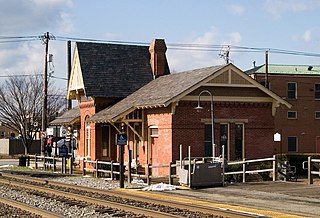
Gaithersburg station is a commuter rail station located on the Metropolitan Subdivision in downtown Gaithersburg, Maryland. It is served by the MARC Brunswick Line service; it was also served by Amtrak from 1971 to 1986. The former Baltimore and Ohio Railroad station building and freight shed, designed by Ephraim Francis Baldwin and built in 1884, are listed on the National Register of Historic Places as Gaithersburg B & O Railroad Station and Freight Shed. They are used as the Gaithersburg Community Museum.
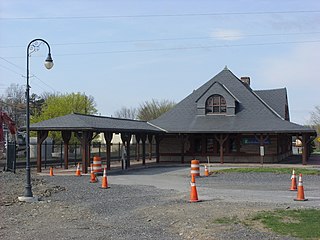
Union Station served the residents of Chatham, New York, from 1887 to 1972 as a passenger station and until 1976 as a freight station. It was the final stop for Harlem Line trains. It had originally served trains of the Boston and Albany Railroad, then the New York Central Railroad and the Rutland Railway. It served as a junction for service that radiated to Rensselaer, New York, to the northwest; Hudson, New York, to the southwest; Vermont, to the northeast, and Pittsfield, Massachusetts to the east and New York City, to the south.

Lehigh Valley Railroad Station is a historic railway station located at Rochester in Monroe County, New York. The Lehigh Valley Railroad built the station in 1905 but stopped using the station for passenger service in the 1950s. Later the station was used as a bus terminal and then as a night club. In the 1980s the building was added to the National Register of Historic Places and today it houses the Dinosaur Bar-B-Que restaurant.

New Paltz station is a former train station in the village of New Paltz in Ulster County, New York. The building was the first of two railroad stations constructed in the town of New Paltz, and it is the only former Wallkill Valley Railroad station standing at its original location.
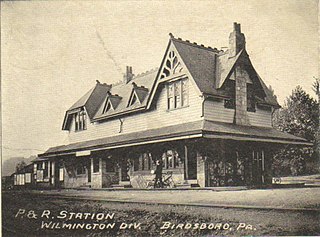
The Reading Company used two passenger railway stations in or near Birdsboro, Pennsylvania. The Philadelphia and Reading Railroad built a station on its Main Line in Exeter Township, on the opposite side of the Schuylkill River from Birdsboro. The Wilmington and Northern Railroad established a freight line to Birdsboro in 1870, but it was not until after its merger with the Reading Company that its passenger station was built in the borough.

The Howard Hardware Storehouse is a historic storage building off Bridge Street in Bellows Falls, Vermont. Built about 1895, it is a surviving reminder of the city's railroad-related economic past, built in a distinctive tetrahedral shape to accommodate nearby railroad lines. It was listed on the National Register of Historic Places in 1990.

North Bennington station is a historic railroad station at Depot Street and Buckley Road in North Bennington, Vermont. Built in 1880 as a passenger station, this Second Empire brick building is a surviving reminder of North Bennington's former importance as a major railroad hub in southwestern Vermont. It was listed on the National Register of Historic Places in 1973 as North Bennington Depot.
The Morrisville Depot located at 10 Depot Street in Morrisville, Vermont, is a decommissioned historic train station. Built in 1872 to serve the Portland and Ogdensburg Railway, the depot was known as the most important train station for the Vermont lumber industry, for its decorative architectural ornament, and for housing the headquarters of the St. Johnsbury and Lamoille County Railroad from 1959 to the early 1970s. It was subsequently converted into a restaurant. The Morrisville Depot was added to the National Register of Historic Places in 1982 as building #15 in the Morrisville Historic District.

The Aiken Stand Complex is a historic pair of buildings at the junction of Royalton Turnpike and Sayer Road in rural Barnard, Vermont. Built c. 1805 and 1835, they were the centerpiece of a small village that flourished in the first half of the 19th century, when the Turnpike was the principal north–south route through the region. The buildings were listed on the National Register of Historic Places in 1983.

The Fox Stand is a historic multipurpose commercial and residential building at 5615 Vermont Route 14 in Royalton, Vermont. Built in 1814, it served as a tavern and traveler accommodation on the turnpike that ran along the north bank of the White River. It has been adaptively reused in a variety of configurations, most recently as a restaurant and dwelling for the restaurant's operator. It was listed on the National Register of Historic Places in 2015 as a particularly fine example of a Federal period tavern.
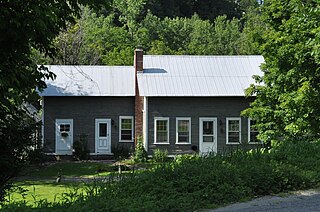
The Royalton Mill Complex is a three-building residential site in what is now a rural setting of Royalton, Vermont. The two houses and barn are historically associated with a mill, whose breached dams and remnant foundations lie just to the north. One of the houses, built about 1780, is believed to be Royalton's oldest surviving building. The complex was listed on the National Register of Historic Places in 1983.

The South Royalton Historic District encompasses the central portion of the village of South Royalton, Vermont. Now the town of Royalton's principal commercial center, it developed in the second half of the 19th century around the depot of the Vermont Central Railroad. The district includes fine examples of Greek Revival and Victorian architecture, and is home to the Vermont Law School. It was listed on the National Register of Historic Places in 1976.

The Tunbridge Village Historic District encompasses the early 19th-century village center of Tunbridge, Vermont. Stretched linearly along Vermont Route 110, the largely agricultural village reached its peak population around 1820, and was bypassed by the railroads, limiting later development. It was listed on the National Register of Historic Places in 1994.

The Johnson Railroad Depot was a historic former railroad station on Railroad Street in Johnson, Vermont. Built in 1887, it was an excellent example of Victorian railroad architecture, serving as a gateway for the town's industrial products to markets nationwide. Converted to commercial use after rail service was discontinued on the line, it was listed on the National Register of Historic Places in 1980. It has since been demolished; a modern building stands where it used to.

The Greensboro Depot is a historic railroad station on Main Street in the village of Greensboro Bend, Vermont. Built about 1872 by the Portland and Ogdensburg Railroad, it is a well-preserved example of that railroad's early station designs, and a reminder of the village's historic association with the railroad. It was listed on the National Register of Historic Places in 1975.
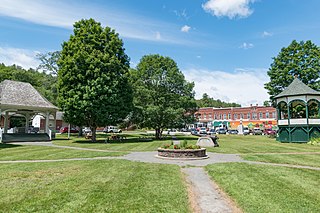
The South Royalton Green is a historic public park in the center of South Royalton, Vermont.






















